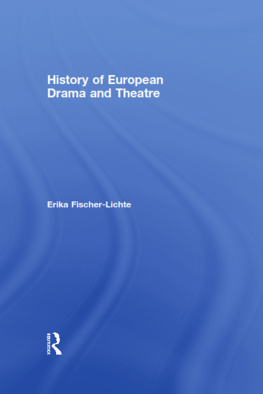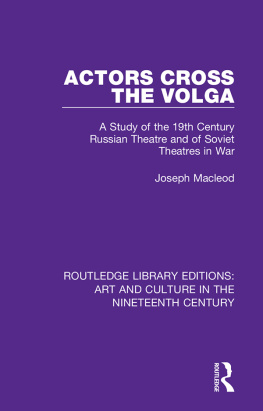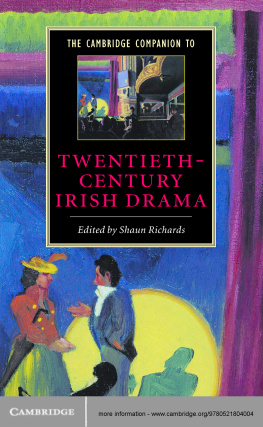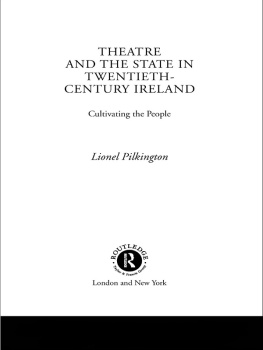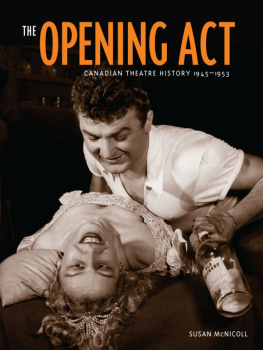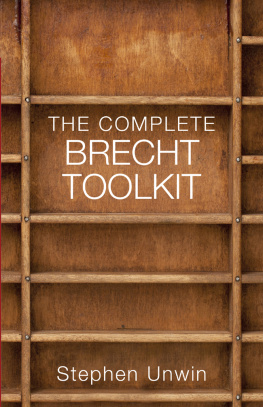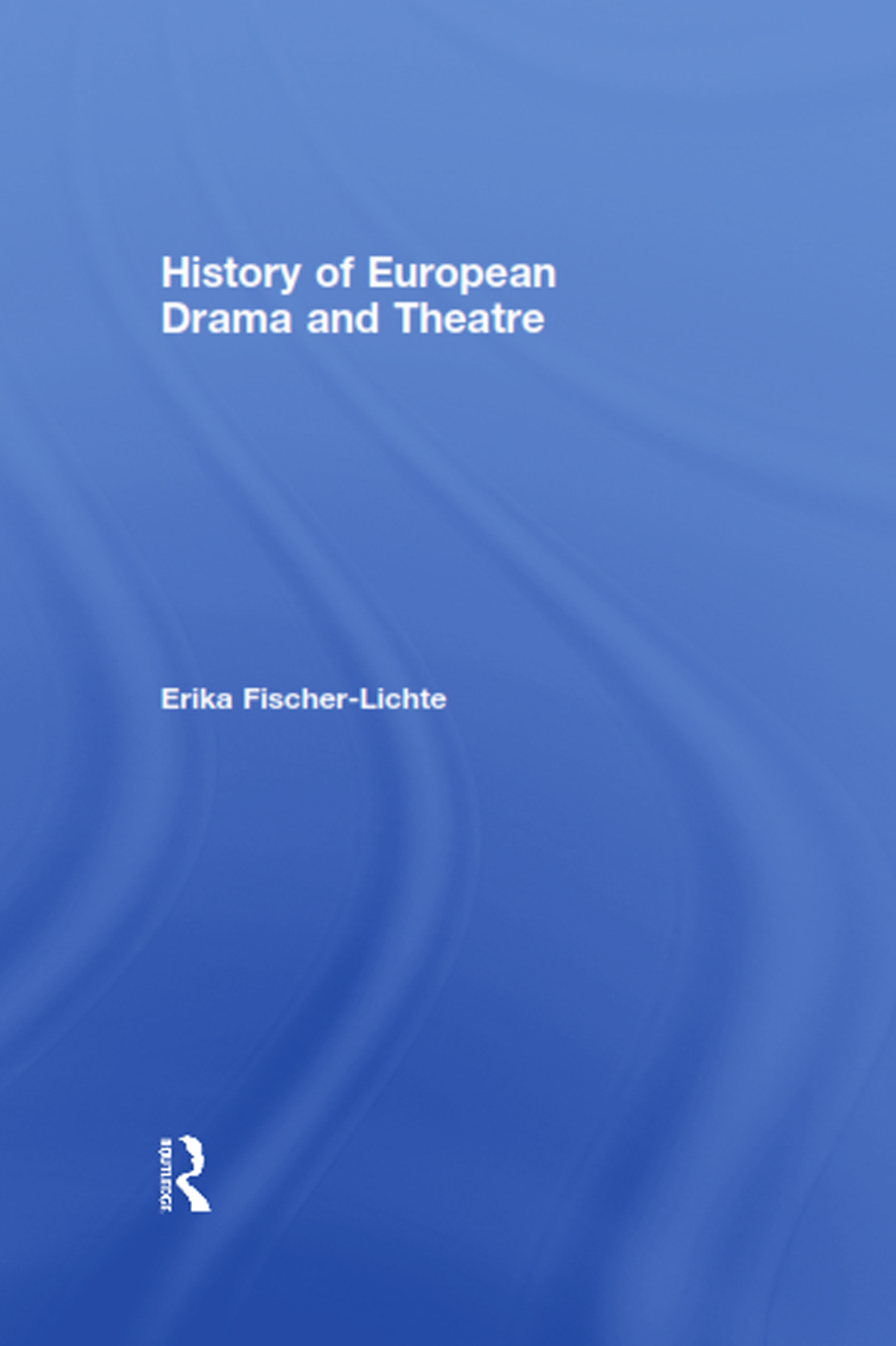History of European Drama and Theatre
This major study reconstructs the vast history of European drama from Greek tragedy through to twentieth-century theatre, focusing on the subject of identity. Throughout history, drama has performed and represented political, religious, national, ethnic, class-related, gendered and individual concepts of identity. Erika Fischer-Lichte's topics include:
Ancient Greek theatre
Shakespeare and Elizabethan theatre; Corneille, Racine and Molire
The Italian commedia dell'arte and its transformations into eighteenth-century drama
The German Enlightenment Lessing, Schiller, Goethe and Lenz
Romanticism Kleist, Byron, Shelley, Hugo, de Vigny, Musset, Bchner and Nestroy
The turn of the century Ibsen, Strindberg, Chekhov and Stanislavsky
The twentieth century Craig, Meyerhold, Artaud, O'Neill, Pirandello, Brecht, Beckett and Mller
Anyone interested in theatre throughout history and today will find this an invaluable source of information.
Erika Fischer-Lichte is professor of theatre research at the Freie Universitt Berlin, Germany, and president of the International Federation of Theatre Research. Her numerous publications include The Show and the Gaze of Theatre: A European Perspective (1997) and Semiotics of Theatre (1992).
History of European
Drama and Theatre
ERIKA FISCHER-LICHTE
Translated by Jo Riley
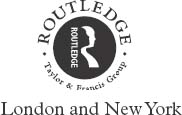
First published 2002
by Routledge
2 Park Square, Milton Park, Abingdon, Oxon OX14 RN 4
Simultaneously published in the USA and Canada
by Routledge
711 Third Avenue, New York, NY 10017
Routledge is an imprint of the Taylor & Francis Group
First published in German in 1990 as Geschichte des Dramas
(vols 1 & 2) by A. Francke Verlag, Tbingen and Basel
1990 Erika Fischer-Lichte
Translation 2002 Routledge
Typeset in Plantin by Taylor & Francis Books Ltd
All rights reserved. No part of this book may be reprinted or reproduced
or utilised in any form or by any electronic, mechanical, or other means,
now known or hereafter invented, including photocopying and
recording, or in any information storage or retrieval system, without
permission in writing from the publishers.
British Library Cataloguing in Publication Data
A catalogue record for this book is available from the British Library
Library of Congress Cataloging in Publication Data
Fischer-Lichte, Erika. [Geschichte des Dramas. English]
History of European Drama and Theatre/Erika Fischer-Lichte.
Includes bibliographical references and index.
1. European dramaHistory and criticism. 2. TheaterEuropeHistory.
I. Title.
PN1731 .F513 2001
809.2'0094dc21 2001034969
ISBN 0415180597 (hbk)
ISBN 0415180600 (pbk)
Contents
Acknowledgements
Every effort has been made to obtain permissions to reprint all the extracts included in this volume. Persons entitled to fees for any extracts reprinted here are invited to apply in writing to the publishers. Permission given by the copyright holders for the following extracts is gratefully acknowledged:
Aeschylus: from Agamemnon, trans. R. Lattimore, in The Complete Greek Tragedies, eds D. Grene and R. Lattimore, Chicago and London: University of Chicago Press, 1960. By permission of University of Chicago Press. 1947 Richmond Lattimore.
Aeschylus: from The Eumenides, trans. R. Lattimore, in The Complete Greek Tragedies, vol. III, eds D. Grene and R. Lattimore, Chicago and London: University of Chicago Press, 1960. By permission of University of Chicago Press. 1953 University of Chicago.
Aeschylus: from The Libation Bearers, trans. R. Lattimore, in The Complete Greek Tragedies, vol. II, eds D. Grene and R. Lattimore, Chicago and London: University of Chicago Press, 1960. By permission of University of Chicago Press. 1953 University of Chicago.
Georg Bchner: from Danton's Death, in Danton's Death, Leonce and Lena, Woyzeck, trans. Victor Price, Oxford: Oxford University Press, 1971. By permission of Oxford University Press.
Anton Chekhov: from Three Sisters, trans. Elisaveta Fen (1951), by permission of Penguin UK. 1951 Elisaveta Fen. From The Seagull, in Anton Chekhov Plays, trans. Elisaveta Fen, London: Penguin, 1954. By permission of Penguin UK. 1954 Elisaveta Fen.
Euripides: from The Bacchae, trans. W. Arrowsmith, in The Complete Greek Tragedies, vol. III, eds D. Grene and R. Lattimore, Chicago and London: University of Chicago Press, 1960. By permission of University of Chicago Press. 1959 University of Chicago Press.
Carlo Goldoni: from The Servant of Two Masters, trans. J.M. Dent, Cambridge: Cambridge University Press, 1928. By permission of Cambridge University Press.
Jerzy Grotowski: from Towards a Poor Theatre, London: Methuen, 1975. By permission of Methuen Publishing Ltd.
Heinrich von Kleist: from Prince of Homburg, trans. Martin Greenberg, in Heinrich von Kleist, Five Plays, New Haven and London: Yale University Press, 1988. By permission of Yale University Press.
J.M.R. Lenz: from The Tutor, in Lenz. Three Plays, trans. Anthony Meech, London: Oberon Books, 1993. By permission of Oberon Books.
Gotthold Ephraim Lessing: from Emilia Galotti, in Five German Tragedies, trans. and with an introduction by F. J. Lamport, Harmondsworth: Penguin, 1969. By permission of Penguin, UK.Translation 1969 F.J. Lamport.
Heiner Mller: from Hamlet-Machine, in Theatremachine, trans. Marc von Henning, Boston and London: Faber and Faber, 1995. By permission of Faber and Faber, UK.
Luigi Pirandello: from Six Characters in Search of an Author, Collected Plays, vol. 2, trans. Robert Rietty, by permission of the Calder Educational Trust.
Jean Racine: from Phaedra, in Jean Racine: Four Greek Plays, trans. R.C. Knight, Cambridge: Cambridge University Press, 1982. By permission of Cambridge University Press.
Friedrich Schiller: from Intrigue and Love, in Friedrich Schiller, Plays, ed. Walter Hinderer, trans. Charles E. Passage, New York: the German Library Continuum, 1984. Reprinted by permission of the Continuum International Publishing Group. 1981 the Continuum Publishing Company.
Friedrich Schiller: from Mary Stuart, trans. F.J. Lamport (first published in Five German Tragedies, London, Penguin Classics, 1969; revised edition 1998). By permission of Penguin, UK. 1969, 1998, F.J. Lamport.
Sophocles: from Oedipus the King, trans. D. Grene, from The Complete Greek Tragedies, eds D. Grene and R. Lattimore, Chicago and London: Chicago University Press. By permission of University of Chicago Press. 1942 University of Chicago.
August Strindberg: from Strindberg, The Road to Damascus. A Trilogy, trans. Graham Rawson, London: Jonathan Cape, 1939. Reprinted by permission of the Random House Group Ltd.
Where no source for an English translation is given, the translation is by Jo Riley.
Introduction
THEATRE AND IDENTITY: THEATRE AS LIMINAL SPACE?
In Letter to Monsieur d'Alembert (1758), Rousseau energetically quashed d'Alembert's suggestion (in Geneva, The Encyclopaedia, vol. 7) that Geneva required a theatre in order to keep up with other European cities. Rousseau's main argument was that the theatre would threaten the identity of the inhabitants of Geneva, perhaps even destroy it altogether. His objections concerned both the structure and the content of theatre. Because theatre encourages both men and women to gather together in public for the sake of entertainment, it would attack the traditional forms of communal life in Geneva such as the strictly separated circles of men and women. Moreover, it would also contravene natural female modesty which forbids females from showing themselves in public: A woman outside the hearth loses her most perfect enamel and, robbed of her true naturalness, her appearance is unseemly Whatever she does, the gaze of the public eye is not the place for her. But, for Rousseau, even the male identity is endangered by theatre. Because its main interest is love (p. 210), it threatens to weaken the male and make him effeminate: The constant outbursts of different emotions to which we are subjected in the theatre disturb and weaken us, making us even less able to control our own passions, and the sterile interest which we take in virtue serves only to satisfy our self-love, instead of forcing us to act in a virtuous way (p. 210). Thus, he felt that the theatre alienated both men and women from the fate determined by Nature (p. 246) and cut them off from traditional ways of life being passed down to them. It threatened the cultural, gender and, ultimately, also the individual identity of the Genevans. In order to preserve their sense of identity, Rousseau believed, they should not accept theatre into their society.

